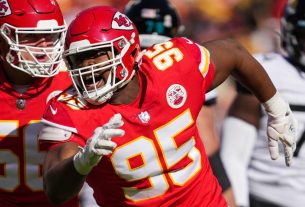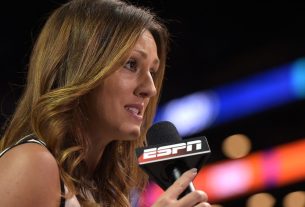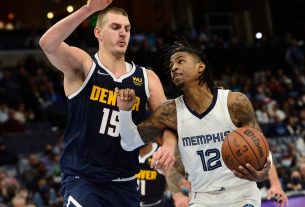
What determines a Super Bowl-caliber quarterback? Stats? The eye test? System compatibility? It’s hard to determine, and it’s arguably impossible to determine, especially for quarterbacks stuck in terrible situations for a majority of their careers. Matthew Stafford was lucky enough to find a way out of his terrible situation in Detroit and win a Super Bowl with Los Angeles, proving that he was in fact the high-end talent that his defenders always claimed he was, even if 2022 hasn’t gone quite as well. I have a strange feeling Derek Carr could follow the same path.
2022 was Derek Carr’s ninth year with the Raiders. Here’s how his nine years compare to Stafford’s final nine years in Detroit on a per-17-game basis:
Stafford (2012-2020) — 63.3 completion percentage, 4659 yards, 28 touchdowns, 13 interceptions, 4.4 TD percentage, 2.1 INT percentage, 7.3 adjusted yards per attempt, 91.1 passer rating, 5.9 percent sack rate, 26 fourth-quarter comebacks, 32 game-winning drives
Derek Carr (2014-2022) — 64.6 completion percentage, 4217 yards, 26 touchdowns, 12 interceptions, 4.4 TD percentage, 2.0 INT percentage, 7.1 adjusted yards per attempt, 91.8 passer rating, 5.1 percent sack rate, 28 fourth-quarter comebacks, 33 game-winning drives
Stafford was 32 years old in his final season with Detroit. Carr will be 32 in two months. Both players reached the playoffs at least twice (although Carr only played in one game due to injury), but never managed to win a playoff game. Stafford endured four different head coaches in his final nine seasons with Detroit. Carr has endured seven. Stafford had arguably the best wide receiver in the NFL for a few years in Calvin Johnson. Carr had Davante Adams this year. He also had a receiving corps including Amari Cooper and Michael Crabtree for several years as well.
Stafford and Carr by the numbers
The similarities between these two quarterbacks are evident, and it goes even deeper than the stats I already mentioned. In terms of adjusted net yards per attempt, Stafford posted a mark of 6.44 between 2012 and 2020. Carr has accrued a figure of 6.41 between 2014 and 2022. Stafford had 26 fourth-quarter comebacks. Carr had 28. Stafford engineered 32 game-winning drives. Carr? 33.
I’m not saying Carr would be a sure-fire hit on a different team. I would never talk in such absolutes. There are definitely some worrying stats with Carr. For example, Carr’s interception percentage has risen each of the last four seasons, from 1.6 percent in 2019 all the way up to 2.8 percent in 2022. Meanwhile, Stafford stayed put, fluctuating minimally between 1.7 percent and 2 percent in his final four years.
Carr’s Raiders have often had a much more consistent running game between Latavius Murray, Marshawn Lynch, and Josh Jacobs than Stafford’s Lions had with Theo Riddick? Kerryon Johnson? Ameer Abdullah? Joique Bell? 35-year-old Adrian Peterson? Furthermore, Stafford never got benched for the likes of Jarrett Stidham. However, that was likely a preventative measure to ensure Carr doesn’t get hurt and cost the Raiders an additional $35 million over the next two years.
Despite the concerns, the similarities between Carr and Stafford outweigh the differences by a wide margin. Carr is still young, extremely durable, and has provided an invaluable veteran presence in the Raiders’ locker room for years now. I understand the concerns with Carr’s play this year. With the addition of Adams, he was supposed to take a huge leap forward. While Tua Tagovailoa and Jalen Hurts experienced tremendous growth with the additions of Tyreek Hill and AJ Brown respectively, Carr stayed stagnant and perhaps even regressed, but I’d argue that had more to do with head coach Josh McDaniels.
Can Derek Carr turn it around?
Since 2016, Carr has had five different play-callers. Here is Carr’s passer rating in the first and second halves of each season with each play-caller.
2016: 90.1 1st half passer rating, 91.7 second half passer rating — Bill Musgrave was the play-caller
2017: 88.5, 79.6 — Todd Downing
2018: 89.9, 97.2 — Jon Gruden
2019: 108.8, 91.6 — Jon Gruden
2020: 110.2, 92.2 — Jon Gruden
2021: 90.0, 97.8 — Greg Olson
2022: 96.6, 73.5 — Josh McDaniels
Do you see the issue? Carr has proven he can still sling the ball with effective play-calling, but in the second half of games this season, Carr turns into his older brother David? I don’t think so. That wasn’t a problem in 2021, or the year before, or the year before that, so on and so on. McDaniels must not know how to adjust an offensive game plan at halftime or something because a difference that large is likely not a coincidence. It’s not just passer rating either.
Carr in the first half of games in 2022:
66 completion percentage, 1852 yards, 14 touchdowns, six interceptions, 7.45 adjusted yards per attempt
Carr in the second half of games in 2022:
54.96 completion percentage, 1570 yards, nine touchdowns, eight interceptions, 5.74 adjusted yards per attempt
McDaniels has held Carr back in 2022, but where the Raiders are in too deep on McDaniels cash-wise to give up on him now, Carr’s departure would be much more money-friendly, and thus, he probably won’t return in 2023. That said, there are several teams that would massively upgrade at quarterback by adding Carr to their roster, and he’s definitely worth a shot and perhaps even a long-term contract. Will he immediately win a Super Bowl like Stafford did? Unlikely. Not only is that practically unpredictable, but the Rams also had a litany of high-end talent between Andrew Whitworth, Cooper Kupp, Jalen Ramsey, and Aaron Donald on their roster. Most teams can’t match that level of all-around talent, but there is a shot.
Carr has been undervalued and gone unappreciated for most of his career, and perhaps a change of scenery is exactly what he needs to get out of the shadow of the Black Hole.


